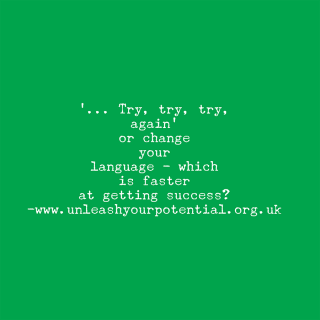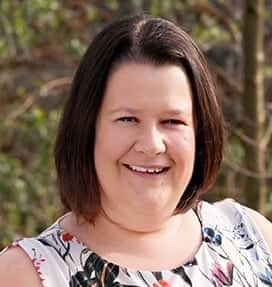Many of you will be familiar with the famous saying, ‘if at first you don’t succeed, try, try and try again’. It’s a motto that I used to hear quite frequently. But is this a phrase that is helping you to succeed or is it inadvertently hindering or making things harder for you?
Where did the phrase come from?
This phrase, according to The Independent was first used by Robert the Bruce, king of Scotland, with his troops shortly before walloping the English at Bannockburn in 1314. Other Sources date it more recently, or indeed to other sources – however what’s not disputed is that it’s a phrase that’s been around for a long time. I remember my Gran using this phrase when I was growing up in order to encourage me to keep trying despite my first attempts not being as successful as I might have liked. On the face of it you could argue the phrase sits nicely along side the NLP presupposition of ‘there is no failure only feedback’ and it’s the feedback that you should use to continue to improve your efforts. It’s a phrase some argue is about resilience – about not giving up or persistence – ‘persistence in the end pays off’ is another phrase sometimes used. To others it may mean something entirely different. You hear the phrase ‘at least I tried’ or ‘I could try doing it again, I suppose’ or ‘she should try it’.
The word ‘try’ is a word used all the time in our every day language – coaches and managers in professional sport might use it, parents and teachers use it to encourage the young, at work line managers wishing to support their teams may use it as words of encouragement ….
How does the mind process the word ‘try’ …
The challenge with the well-known phrase is the word ‘try’. Simply put, ‘try’ implies there is a possibility of failure – and to be most successful, it’s better that the unconscious mind stays away from this possibility, this distraction. Think about it for a moment -when you use the word ‘try’ are you indicating that you are 100% certain of success? (like the phrase ‘I’ll give it a go’) – incidentally, the only time I like to hear the word ‘try’ is when the International Rugby is on!
Could changing our language help achieve better results?
Yes; my belief is that if you want to be successful at anything you put your mind to, better that you set a firm compelling goal (a well formed outcome is even better – we teach you how to do this on our NLP courses) and ensure you deal with anything at an uncurious level that will stop you along the way (e.g. limiting beliefs, internal conflicts like part of me thinks ‘x’ and part of me thinks ‘y’etc).
Many people think of NLP as a fantastic set of tools and techniques that help deliver change (which it does) and what many people don’t realise (unless they’ve studied NLP correctly) is that language is just as important at delivering change techniques. Communication and the Language we use influences others (and our own mind) and often people don’t use language consciously in order to get results.
This is why on our online introductory courses, NLP Demystified, the NLP Diploma in Coaching and NLP Business Diploma, we teach some language skills – such as Meta Model Language – which is the language of specificity (getting really specific with our questioning in order to get better results). On our NLP Diploma course we also introduce the concept of Metaphors and using story telling to teach and bring about change in others (everyone likes a story, right?) – the art of a good metaphor is that people don’t know it’s about them, it has a purpose and we teach you how to design and utilise metaphors.
On the Diploma courses we have taken a few of the NLP Practitioner and NLP Master Practitioner topics and pulled them together to give you a taste or an introduction into a number of areas. If you’re ready to learn the whole NLP Practitioner Syllabus then check out the course schedule where we teach you how to make changes in yourself and others really elegantly.
___________________________________________________________________
Laura is passionate about helping people realise their potential, and achieve the results they deserve. She believes, if you change your thinking, you can change your results. If you’d like to find out more about Unleash Your Potential, you can check out our NLP courses and coaching options, and link up with us via our Facebook page, follow us on Twitter or link up with Laura via LinkedIn. You can of course also email us at: [email protected]


